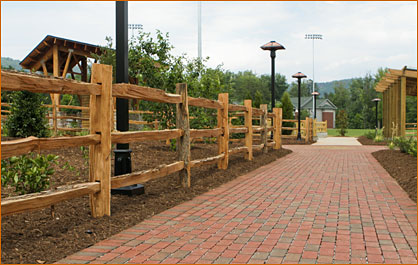Pine Hall Brick Pavers at Work
Words: Dan KamysJanuary 2009
Case Study - Hardscaping
StormPave permeable clay pavers helped in building an entirely green house.
|
?? |
|
|
The goal was simple: Build a green house.
Then it got more complicated: Build an entirely green house, from the foundation to the roof, inside and out. Build a structure that not only uses materials made from renewable and recycled resources, but also can help conserve water.
The Cliffs Cottage at Furman, built on the Furman University campus in Greenville, S.C., succeeded in meeting its goals. Now on exhibit for a year, the 3,400-square-foot residential home will eventually become the Furman University Center for Sustainability.
From the bamboo flooring to the solar panels in the roof, the house has all of the latest technological innovations in sustainable living. The commitment to environmentally sound design went even further, extending from the house itself to the landscaping, organic and formal gardens, and rainwater collection systems.
Scott Johnston, principal of Johnston Design Group, the architecture firm that oversaw the Cliffs Cottage design, says the basic goal was to make everything except the roof pervious to both absorb water and eliminate stormwater runoff.
A permeable solution
The answer was to use pervious paving surfaces, including StormPave permeable clay pavers from Pine Hall Brick.
"We wanted a warmer paving material than we could get out of pervious concrete or gravel," says Johnston. "And, this gave us a way to upgrade the finish in the front entry walk and a couple of terraces that are close to the house."
Johnston says the Pine Hall brick paver combined management of stormwater with the classic beauty that genuine clay provides, which is important from both an environmental and a design aspect.
Ed Marshall, director of special projects for Furman University and project director for the Cliffs Cottage project, agrees.
"The Pine Hall Brick permeable clay pavers were a perfect addition to this project," says Marshall. "It is really a marriage of design and function."
StormPave and a similar product, RainPave, are the first of their kind. The two resemble other clay brick pavers in Pine Hall Brick's product line. But, unlike the others, these pavers have a larger space between them ??? a higher void area ??? that allows water to infiltrate through the pavement surface.
Underneath the pavers, instead of a conventional installation that includes a bed of crushed stone and sand, with sand swept into the joints on top, there is a series of "open graded" aggregates ??? gravel without fine particles ??? used as a base.
The largest stones are placed on the ground, layered with progressively smaller stones. The pavers are carefully placed, and the smallest stones are swept into the joints between the pavers. The series of open aggregates allows rainwater to flow as good bacteria builds around the rocks over time and aids in reducing some pollutants.
Saving water
Johnston, the architect at Cliffs Cottage says builders often think of stormwater as a liability to be avoided, perhaps as a potential flood or a lawsuit from the owner of a piece of property nearby. He says stormwater management has become part of the designer's mindset at the planning stages of a project, as they incorporate gray water usage and groundwater pollution prevention into early site planning.
"Sustainable design is thinking of rainwater as a resource," says Johnston. "When you start thinking that way, it really affects the selection of a lot of things but, particularly, paving products."
Johnston says well-designed, permeable pavement systems provide sufficient surface water infiltration and water storage, and products like Pine Hall Brick pavers provide designers with a method to capture peak runoff pollutants from storm water, reducing "first flush" pollutants from entering lakes, streams and storm drains.
Return to Table of Contents